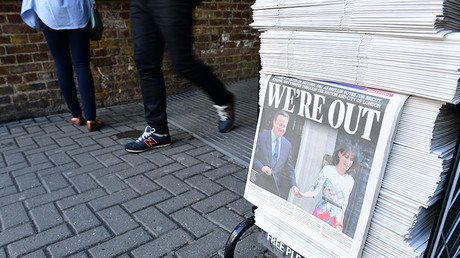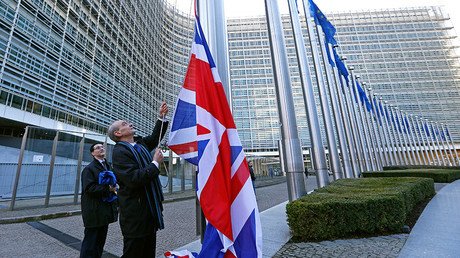Brexit could have destroyed UK…& it might be for the best

It looks increasingly possible that Brexit will lead to the demise of the United Kingdom. That may be for the best, as it's abundantly clear that the four members now have markedly different concerns.
Do you remember where you were on May 1, 2004? I do. I was in Dublin watching the Irish government - which held the rotating European Union presidency - welcome 10 new members to the bloc. It was the single biggest expansion, in terms of population, in the EU’s history. But tellingly, not in terms of wealth.
Make no mistake: that was also the day Britain’s membership of the EU became unsustainable. Because the main reason Brexit has been passed is English anger at the consequences of unfettered mass immigration. Despite a negative fertility rate (1.75 in 2004 vs. 2.41 in 1971), the population of the United Kingdom rose from 59.99 million in 2004 to 64.1 million in 2013. That surge of over 4 million in less than a decade is greater than the entire increase in the 33 years from 1971-2004.
Before the 2004 expansion, which admitted the likes of Poland, Hungary, Slovakia and the Baltic States, internal EU migration was manageable. That was down to the fact that living standards weren’t vastly different across the union. For example, life in Portugal, the then-poorest member, wasn’t that much worse than in wealthier countries like Germany, France and Denmark. However, the gap between wages in Latvia, for instance, and London was astounding. Back in 2004, the average worker in Riga brought home €239 ($265) a month. That was less than 10 percent of London incomes which were £2,058 (around €2,900 at the time). Thus, it’s hard to blame east Europeans for seizing the opportunity to move west.
Ill fares the land
Britain’s post-war social democratic consensus has been under pressure since the Thatcher years, but EU expansion collapsed it. Rightly or wrongly, resentment has taken hold at the perception, fueled by the media, that foreigners are abusing the UK benefit’s system. Meanwhile, British workers have endured declines in real wages in the past decade. The reason is easy to understand. The wide availability of cheap labor, unrestricted by visa requirements, has enabled employers to conduct a race to the bottom, heightening inequality. And to make things worse, the population explosion has increased competition for housing, leading to enormous inflation in rent and property prices. Put simply, for common folk, life in England is getting worse.
'Freaking out': Banks divided on whether to stay in London or not after #Brexithttps://t.co/DchgR9SuKupic.twitter.com/fb25hZgHgE
— RT (@RT_com) June 24, 2016
I say England, rather than Britain, because this is all about England. Or more precisely, England and Wales, (except London of course, which is a different world entirely these days). Scotland and Northern Ireland have overwhelmingly voted to remain in the EU. Of course, for reasons of climate and economics, both are far less attractive to migrants than England or Wales and their status as net recipients from the UK budget means they have less at stake than other regions. Yet, things aren’t that simple.
Ulster says yes
Northern Ireland needs the EU because the peace settlement which ended its decades-long civil war, or ‘Troubles,’ was contingent on Dublin and London being legally joined via Brussels. Additionally, Ulster’s economy is heavily-dependent on trade with the vastly richer Irish state. In Scotland’s case, attitudes to ‘Britishness’ differ from those in England. In Scotland, to be British is to face inwards, but to be European is to face outwards. Down south, ‘Englishness’ and ‘Britishness’ are mostly synonymous.
Now, 62 percent of Scots have voted to remain in the EU, but because they are controlled by London, their democratic wishes matter not a jot. With that in mind, it’s hardly a surprise that Scottish Nationalists have already issued calls for a new referendum on independence.
Nicola Sturgeon says EU result is "democratically unacceptable" for Scots and represents "a material change" for Scotland in the UK.
— Peter A Smith (@PeterAdamSmith) June 24, 2016
One that even those who passionately supported the survival of the UK in 2014 might support.
Scotland will seek independence now. Cameron's legacy will be breaking up two unions. Neither needed to happen. https://t.co/4MDj7pndcq
— J.K. Rowling (@jk_rowling) June 24, 2016
In Northern Ireland things are less straightforward.
BREAKING: Sinn Fein says "British government has forfeited any mandate to represent economic or political interests of people in N Ireland"
— Marc Mallett (@MarcMallett_UTV) June 24, 2016
Pro-Irish republicans were far more likely to support the EU than pro-British loyalists, whose leaders campaigned for Brexit. The (historically mainly-Catholic) nationalists will now hope that moderate unionists (usually nominally-Protestant) can be persuaded to support a united Ireland, sacrificing ethnic tradition for economic reality. However, there is no guarantee that citizens of Ireland itself would agree to accept them at this time. The south has only just recovered from the greatest economic crisis in its history and may feel it cannot afford unity. Unless of course, Brussels is willing to underwrite the project. That is not as outlandish as it seems. Because Eurocrats are angry and may want to ‘punish’ England.
EP pres Martin Schulz says there will be "consequences" for Britain so other EU countries are not "encouraged to follow that dangerous path"
— John Stevens (@johnestevens) June 24, 2016
Eurocrat rage
The European Parliament president, Germany’s Martin Schulz, announced Friday morning that there will be "consequences" for Britain so other EU countries are not "encouraged to follow that dangerous path.” Now Schulz’s comments might be mean and vindictive and show contempt for democracy, but they also reflect realpolitik in Brussels.
If the UK, or whatever is left of it, is successful outside the EU, it will be the biggest disaster imaginable for the EU establishment - an elite of unelected rootless cosmopolitans often contemptuous of public opinion. It will show that a brighter future is possible and expose ‘project fear’ as a load of baloney. Brussels has pushed a mantra for nearly 60 years now that European integration makes things better and that there is no alternative. If a country as important as England proves that theory wrong, all bets are off. Actually, maybe they already are.
Let’s be honest, nobody really expected this result. Even UKIP leader Nigel Farage practically conceded defeat for Brexit on Thursday night. When people realized, early Friday morning, that Leave was winning, it was as much of a shock as if England had beaten Germany in a penalty shoot-out. In ice hockey. Even Brexit’s best known exponent, Boris Johnson, looked stunned when he eventually emerged to face the cameras.
We are now in uncharted waters. A member state has decided to leave the EU. A major one at that. Furthermore, the vote has exposed deep divisions inside the UK itself. Discord perhaps profound enough to mean its demise. Nevertheless, in the long term, such an outcome may be better for all concerned.
The statements, views and opinions expressed in this column are solely those of the author and do not necessarily represent those of RT.















